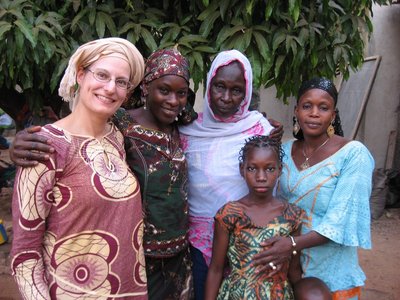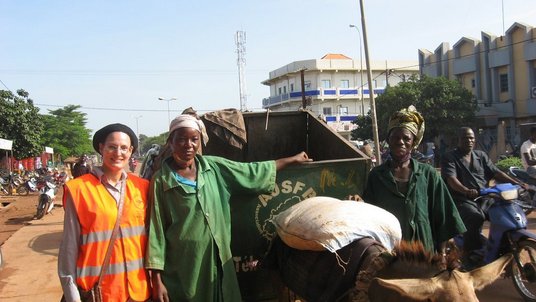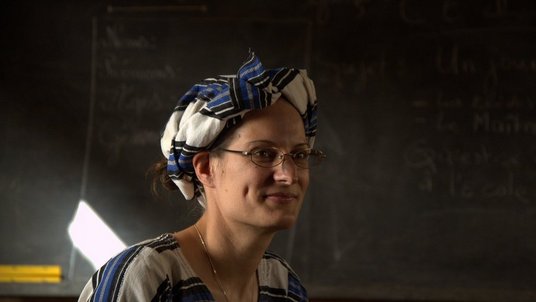

In 2009 I had just finished my master’s studies in Social and Cultural Anthropology, but I was still in my Sociology studies at the University of Vienna. While completing my Master in Sociology I started preparing a research proposal for my PhD thesis. I wanted to reconcile my research interests in urban anthropology, environmental anthropology, sociology with a focus on social change and inequality as well as African studies. One of my colleagues in Social and Cultural Anthropology received a Marietta Blau-Grant in 2010. This encouraged me to also apply for a grant. As a trained ethnographer the opportunity to conduct fieldwork for one whole year was very tempting. I was not enrolled in one of the rare, funded PhD programs at the University of Vienna at that time and an application for a 3-year PhD scholarship had failed. My last hope was based on the Marietta Blau-Grant, otherwise I would not have been able to pursue my research endeavour.
Getting oriented in the field
I was very much excited when I was awarded the Marietta Blau-Grant in June 2011. The research stay in Bamako, Mali started soon after. I wanted to find out about the possibilities of urban dwellers to protect the urban environment. My focus was particularly on marginalized and poor inhabitants in densely populated slum-like inner urban areas as well as peri-urban informal settlements. Knowing French and the most common local language spoken in Bamako turned out to be essential in conducting participant observation. First, I framed environmental protection as the sustainable disposal of garbage and wastewater. I soon learned about fabric dyeing activities at the bank of the Niger River, floodings caused by blocked drainage systems and wastewater reuse for urban gardening. I was often struck by the visual and olfactory presence of human residues, something I was not used to in Vienna with its well-functioning waste and sanitation facilities and services. The municipal government’s prioritisation, planning deficiencies, as well as most residents’ lack of responsibility for public spaces, were causing detrimental effects on the natural environment and public health.

Rescheduling research activities
With the coup d’état in March 2012 my research stay in Bamako was interrupted for more than one year. I finally decided to continue my research in Ouagadougou, Burkina Faso. I am grateful for OeAD’s cooperation and flexibility in this regard. In retrospect, the unplanned change of my research strategy broadened my knowledge of historical, political and other contextual factors that shape the attitudes, discourses and actions regarding the urban environment. Meeting local researchers, representatives of community-based organisations and international NGOs as well as professionals in waste management and sanitation helped me in better understanding local challenges. In addition to interviews, I also participated in street cleaning and waste collection activities. I was impressed by the entrepreneurship of individuals who earned their living in faecal sludge collection and treatment, waste picking or recycling.
Ethnographic research is much more than research
The fieldwork taught me lessons about practices of solidarity in families and neighbourhoods, about perseverance, the power of philanthropy and humour. But as a young female researcher living with host families in Bamako and Ouagadougou, I was also confronted with traditional gender roles. In my position as a white researcher, residents, neighbourhood associations and professionals had high expectations that I could not always meet. Back in Europe, I appreciate the respect for human rights and democratic principles, reliable public services and greater personal freedom. I am still in contact with my former host families and some research partners who became friends. While holding a seminar on informality as an urban way of life in West Africa at the University of Bremen in 2020, I invited some former research partners to virtual sessions. Unfortunately, the political situation does not allow for a resumption of research activities in the region.

Lasting usage of gained knowledge
Currently, I am collaborating on a research project on gender-sensitive urban transformation in Ethiopia and Mozambique funded by APPEAR: www.donau-uni.ac.at/girt. I can make use of some of the knowledge and skills acquired during my field research in Mali and Burkina Faso. Extending my expertise to East and Southeast Africa makes me aware of the many differences between these (postcolonial) settings. This time my participation is mostly concentrated on project management and coordinating a consortium of researchers with various disciplinary backgrounds. Reflecting on my previous understanding of factors for social change with new insights gained from informal settlements and urban slums in Ethiopia and Mozambique is intriguing.
Elisabeth Huber has won a Marietta Blau-Grant and has done 12 months of field research in Mali and Burkina Faso in cooperation with the Université des Sciences Sociales et de Gestion de Bamako and the Université de Ouagadougou between 2011 and 2014. She has completed her PhD in Social and Cultural Anthropology at the University of Vienna and is now working at the University for Continuing Education Krems. Her PhD thesis was published as an open access book in 2020: www.transcript-verlag.de/978-3-8376-5116-4/armut-und-umweltschutz/.
